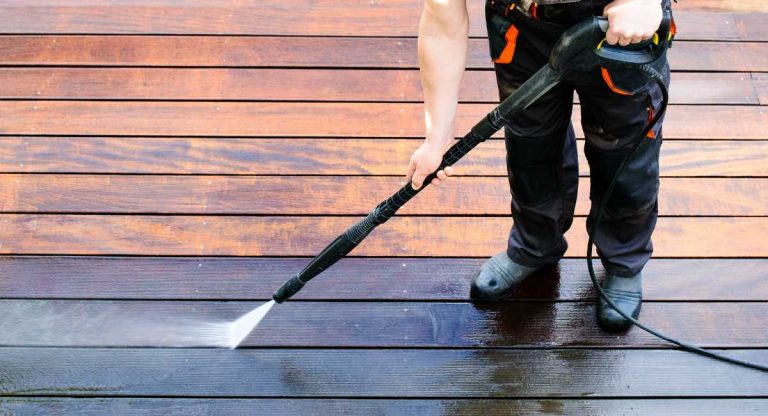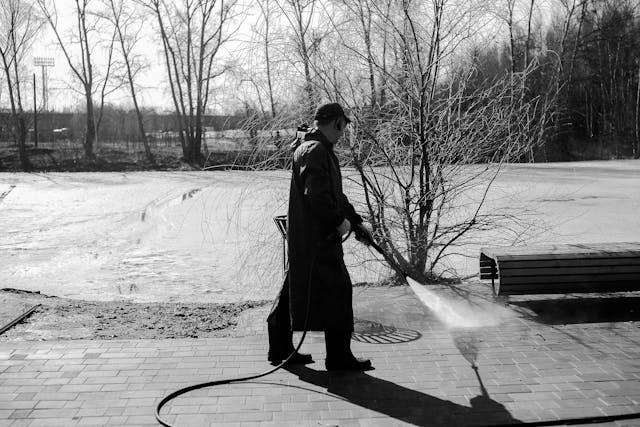
Not all power washing jobs are created equal—and not all surfaces can withstand the same level of pressure. When you’re dealing with delicate materials, specialty finishes, or high-value structures, choosing the right company to do the job is critical. One mistake could lead to thousands of dollars in damage. 🧼⚠️
If you’re planning to clean sensitive areas like historic buildings, luxury homes, painted wood, stucco, custom stonework, or intricate trim, you need a contractor who combines skill with caution. Here’s how to vet a power washing company before you hand over access to your most valuable surfaces.
🏛️ What Counts as a Sensitive or High-Value Surface?
Any surface that is easily damaged, expensive to repair, or historically/culturally significant requires extra care. Common examples include:
| Surface Type | Risk if Mishandled |
|---|---|
| Painted wood siding | Peeling, water intrusion |
| Stucco or EIFS | Cracking, streaking, etching |
| Historic brick or masonry | Mortar erosion, discoloration |
| Custom pavers or stamped concrete | Pattern fading, sealant damage |
| Natural stone (limestone, slate) | Etching, pitting |
| Roof shingles (asphalt, tile) | Lifting, breakage, mold spread |
| Outdoor art, sculptures, or signage | Surface degradation |
Even newer homes can have surfaces that require low pressure and specialty techniques, especially with modern architectural materials.
Browse Amazon Here For Soft Washing Equipment And Accessories
🧼 Why Standard Pressure Washing Techniques Can Be Dangerous
Traditional power washing uses high-pressure water (2,500–4,000 PSI) to blast away dirt and grime. While this works well for driveways and concrete, it can destroy delicate surfaces, forcing water behind walls, stripping paint, or causing micro-cracks that expand over time. ❌💧
That’s why professional companies use soft washing—a method that combines low-pressure water with eco-friendly detergents to clean without damage.
✅ 10 Ways to Vet a Power Washing Company for Sensitive Jobs
Here’s how to evaluate whether a contractor is truly qualified to handle high-value or delicate surfaces:
1. Ask If They Offer Soft Washing
If they don’t offer low-pressure or soft washing techniques, that’s an immediate red flag. High pressure is rarely appropriate for sensitive surfaces.
2. Request Photos of Past Work on Similar Surfaces
Look for before-and-after examples of work on homes or buildings like yours. Ideally, they should have experience with:
- Luxury homes
- Historic preservation projects
- High-end commercial buildings
- Painted or coated materials
📸 If they can’t show relevant work, they may be learning on your property.
3. Review Their Insurance Coverage
Ensure the company has general liability insurance, specifically covering exterior cleaning services. For high-value properties, ask if they carry additional coverage or bonds.
🛡️ This protects you in case of damage to siding, landscaping, windows, or adjacent surfaces.
4. Check for Specialty Certifications
While not always required, some contractors pursue certifications from organizations like:
- PWNA (Power Washers of North America)
- UAMCC (United Association of Mobile Contract Cleaners)
- OSHA (for job site safety)
These credentials show they take the job—and your property—seriously.
5. Ask What Products They Use
The best contractors will use non-toxic, biodegradable cleaners that are safe for paint, stone, metal, and plants. Avoid anyone who uses harsh chemicals like bleach on porous materials.
🌿 Look for enzyme-based or pH-neutral products, especially for stone and painted wood.
6. Discuss Water Pressure Settings in Detail
They should be able to clearly explain how much pressure will be used—and on which surfaces. Typical safe PSI ranges:
| Surface | Safe Pressure Range |
|---|---|
| Stucco | 100–500 PSI |
| Painted wood | 300–500 PSI |
| Limestone/masonry | 100–800 PSI |
| Asphalt shingles | Under 100 PSI (soft wash only) |
| Aluminum siding | 500–1,000 PSI |
If the company can’t articulate this, they likely aren’t experienced with nuanced surface care.
7. Require a Site Visit
Reputable contractors will want to see the surface in person before quoting. This lets them assess:
- Age and condition
- Type of material
- Drainage and runoff needs
- Obstructions or access concerns
📝 If they offer a “flat rate for all houses” without inspection, it’s a red flag.
8. Ask for a Test Spot or Patch Area
Before full cleaning, ask for a small test area—especially on painted surfaces or historic stone. This lets you see:
- If the color fades
- How the material reacts
- Whether cleaning leaves streaks
A cautious company will be happy to oblige.
9. Confirm They Protect Landscaping and Windows
They should use coverings, shields, or gentle spray patterns near:
- Flower beds 🌺
- Wood shutters
- Decorative windows or trim
- Outdoor electrical components
Extra care shows a commitment to total job site safety and quality.
10. Read Reviews Carefully
Look beyond star ratings. Search reviews for terms like:
- “delicate surfaces”
- “historic home”
- “paint didn’t peel”
- “gentle wash”
- “soft washing expertise”
Testimonials from high-end or preservation-focused clients carry extra weight.
💰 Expect to Pay a Premium
Cleaning high-value surfaces costs more due to:
- More time and labor
- Specialty equipment
- Advanced detergents
- Greater liability
| Surface/Job Type | Estimated Cost |
|---|---|
| Painted wood siding (full home) | $500 – $1,200 |
| Stucco house | $600 – $1,400 |
| Historic brick or masonry | $800 – $2,000+ |
| Roof soft washing | $400 – $1,000 |
⚠️ Avoid ultra-cheap quotes—they may cut corners and use high pressure where they shouldn’t.
💡 Final Thoughts
Delicate doesn’t mean difficult—if you hire the right team. Vetting a power washing company for sensitive or high-value surfaces takes a little more time, but it can save you from costly mistakes or irreversible damage.
Choose a team that understands surface science, uses gentle techniques, and has the insurance, experience, and respect your property deserves. 💎🧼
Because the only thing that should be removed is the grime—not the finish beneath it.
Browse Amazon Here For Soft Washing Equipment And Accessories






